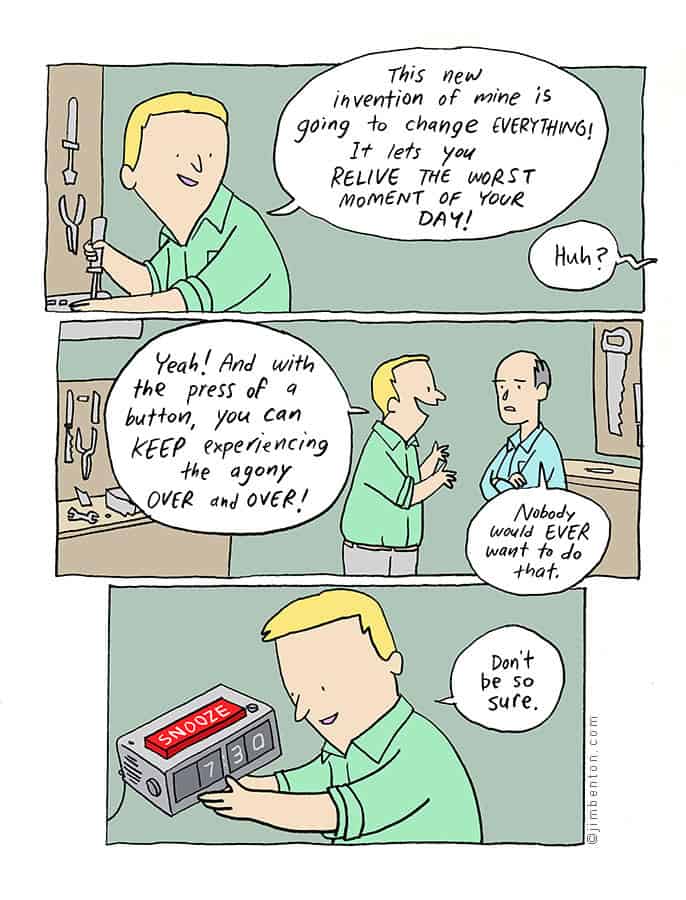It’s 6am Monday morning and you wake up to one of the most awful sounds ever known to mankind, the dreaded alarm clock.
You roll over and hit the snooze button telling yourself an extra 9 minutes of sleep is going to make getting out of bed so much easier.
Then comes that horrible sound again, and without fail you hit that snooze button for another 9 minutes of sleep feeling even worse than before.
After the second or third round of hitting the snooze button you finally get up to avoid being late for work which catapults you into reactive mode rather than proactive mode.
Why do we let ourselves be a slave to the snooze button?
I swear every morning when the alarm goes off the first thought in my mind is if I hit the snooze button those 9 extra minutes is all I need to feel refreshed.
But what happens?
Those 9 minutes ends up turning into 27 minutes and now I rush to work mode.
Does this ever happen to you?
One survey found that more than ⅓ of Americans have fallen prey to the snooze button.
What’s more alarming (no pun intended) is more than half of people between the ages of 25-34 have fallen into the curse of the snooze button.
So, other than getting us off to a late start, why is it bad to hit the snooze button?
When we wake up to an alarm clock then hit the snooze button several times, each of those mini sleep sessions are very low quality sleep.
Those little sleep sessions end up throwing us off our regular sleep schedule.
When we are on a regular sleep schedule our body will naturally prepare itself to wake up at the proper time.
It starts this approximately an hour or two before us waking.
How so?
During this time our body starts to increase our body temperature and releases the proper chemicals to aide in waking up.
When we hit the snooze button and fall back asleep we are telling our body that it was a false alarm so it stops the process of waking up.
Then when we do it a second time we’ve completely confused our brain and body by disrupting our internal clock resulting in that groggy fuzzy feeling called sleep inertia.
Sleep inertia can last for several hours after waking up and studies have shown that a person loses performance and cognitive skills due to a lack of quality sleep.
We’re also training our body mentally and physically to be in both a reactive state and passive state.
Rather than being productive and proactive we begin our day by procrastinating the very first thing in the morning, which is waking up.
Now that you understand what is happening every time we hit the snooze button, let’s work towards breaking that habit and improving our sleep as a whole.
First, start by committing to getting on a regular sleep schedule by going to bed and waking up at the same time each day, and yes, that includes weekends.
Second, if going cold turkey without the snooze button is too difficult, try limiting yourself to one snooze each morning and from there move towards not snoozing all together.
Third, once your alarm goes off get yourself up out of bed and expose yourself to sun or light.
Fourth, a bonus, remove the alarm clock totally and allow your body to wake up on its own when it’s done sleeping.
Don’t think it can be done see the proof right here.
Hopefully this article helped you understand how to improve your sleep and productivity in a small way. If it did, feel free to share it with a friend or leave a comment.
References
i.https://greatist.com/happiness/snooze-button-bad-for-sleep
ii.https://www.cnn.com/2014/02/06/health/upwave-snooze-button/
iii. https://www.huffingtonpost.com/2014/08/01/why-hitting-snooze-is-bad-for-health_n_5630707.html
iv. https://www.huffingtonpost.com/2014/08/01/why-hitting-snooze-is-bad-for-health_n_5630707.html
